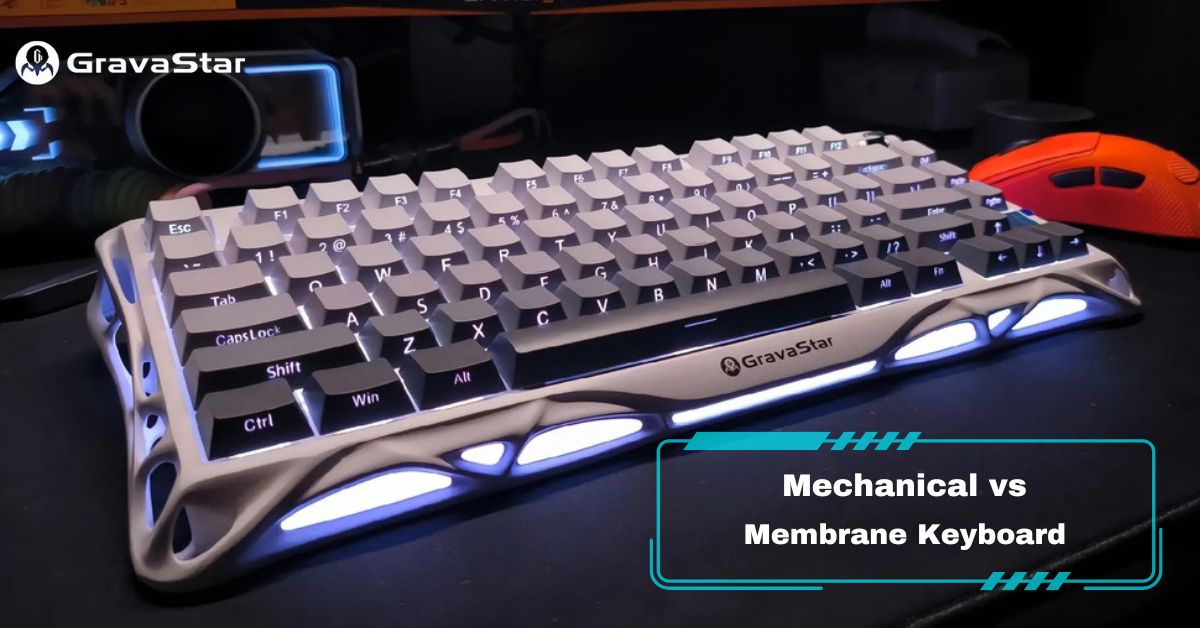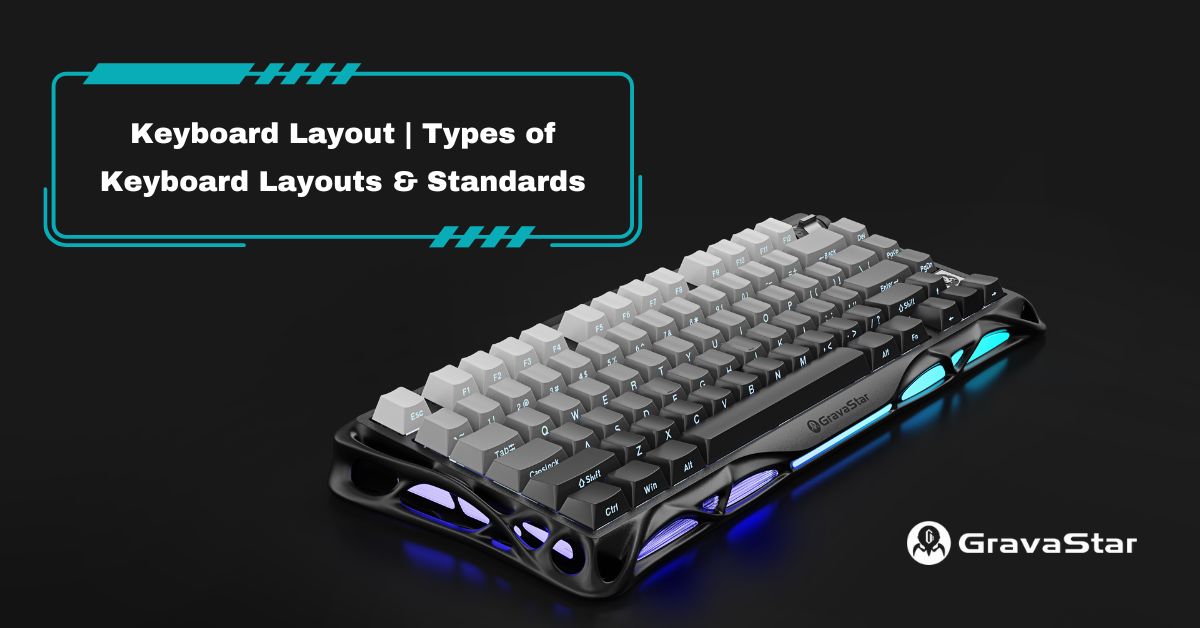Mechanical vs Membrane Keyboard | Which is Better for Gaming?
The right keyboard is a transformative tool for a dedicated gamer, but it can be hard to choose between the hundreds of models that all pitch themselves as the 'best gaming keyboard.'
I started gaming in the 1980s when 386 machines running MS-DOS were cutting-edge. Now, I type all day, every day, so you know I'm dedicated to the nuances of keyboard construction. Let me show you what actually matters when you're choosing between a mechanical and membrane keyboard for gaming.
What is a Mechanical Keyboard?
A mechanical keyboard is a special type of keyboard that uses individual mechanical switches underneath each key to register your keystrokes. These switches provide more tactile and audible feedback than standard office keyboards. They're typically more precise and reliable, so dedicated typists and serious gamers prefer mechanical keyboard designs.
Types of Mechanical Switches
There are three types of mechanical switches used in mechanical keyboards: tactile, clicky, and linear switches. Each type has very different properties, so be sure to choose the one that matches your needs.
Tactile Switches
Tactile mechanical switches are named for their unique physical feedback. Just before reaching the point that registers a keystroke, a little extra force is required during the keypress to complete the action. This tactile resistance feedback makes touch typing much easier without any added noise, preventing accidental key presses and boosting precision.
Clicky Switches
Clicky switches have a similar 'bump' of resistance, but they also contain a special 'click jacket' or 'click bar' that produces a loud, audible clicking noise for additional feedback. While some typists love these switches, the loud click noise can be distracting in shared environments.
Linear Switches
These switches do not have any resistance during the keypress, so the key action is completely smooth and silent. Since they require no additional force to actuate, each keystroke is faster and smoother, giving dedicated gamers an advantage in fast-paced games.
Advantages of Mechanical Keyboards
Durability and Longevity
Mechanical switches are crafted from metal and extremely durable plastics, and they are typically rated for lifespans of at least 50 million keystrokes. Some high-end switches are rated for upwards of 100 or even 150 million keystrokes, which works out to more than a decade of heavy daily usage.
Typing Experience and Feedback
The experience of typing on a mechanical keyboard is completely unlike a membrane keyboard. Each keystroke feels sharp and precise, with plenty of tactile feedback to enhance the effect and a powerful spring that provides a fast rebound action. Developers, gamers, writers, and general typists all agree that mechanical keyboards provide the best possible typing experience.
Customization Options
Most mechanical keyboards can be customized extensively, which adds to their appeal. There are thousands of different switch types to fine-tune your typing experience, and custom keycaps with different profiles give you various style and comfort options. You can even reprogram the keys on most mechanical keyboards to create unique multi-key macro functions for your favorite games.
Disadvantages of Mechanical Keyboards
Cost
The downside to all of these advanced features is their cost. Mechanical keyboards are complex devices with many precisely manufactured parts, which means they are usually more expensive than membrane keyboards.
However, mechanical keyboard costs are shrinking as they grow in popularity, so some entry-level mechanical models are priced lower than expensive membrane keyboards.
Noise Levels
Mechanical keyboards can be noisy, even when they don't have clicky switches installed. Each key makes a noise as it 'bottoms out' at the end of the action and bumps into the switch housing. Mechanical keyboard housings can also act as resonance chambers, amplifying some frequencies.
Weight and Portability
Most mechanical keyboards are heavy, often weighing up to 5 lbs. Manufacturers typically use aluminum for the exterior housing, but even a lightweight ABS frame will get heavier when you add in a full set of mechanical switches. If you like to move your keyboard around or travel with it frequently, you may prefer to choose a lighter membrane keyboard.
What is a Membrane Keyboard?
Membrane keyboard designs use a large flexible plastic membrane with embedded circuitry to register your keystrokes instead of individual mechanical switches. Most cheap office keyboards and laptop keyboards use a membrane design due to their affordable nature, spill resistance, and quiet operation.
How Membrane Keyboards Work
The 'membranes' that give membrane keyboards their name use a three-layer construction system: a soft top layer, a spacer layer with gaps for each key, and a bottom layer. The top and bottom layers contain embedded circuitry, so when you press a key, the soft top layer stretches and contacts the bottom layer through the matching hole in the spacer layer. This completes the electrical circuit and registers the keypress.
Types of Membrane Keyboards
There are two primary types of membrane keyboards, each with very different tactical feedback and typing experiences. Flat designs are typically found in laptops and portable keyboards, while most standard office keyboards use a dome switch design.
Flat Keyboards
These keyboards have an extremely low-profile design, which makes them ideal for laptops and portable keyboards. They are well-suited to quiet environments but usually have smooth keys with limited tactile feedback and extremely short key travel distances.
Dome-Switch Keyboards
Instead of a flat three-layer structure, the top membrane layer has a raised 'dome' underneath each key. As each key is pressed, the entire dome layer deforms downward to make contact with the bottom layer to complete the circuit.
This allows manufacturers to customize the total key travel distance, which provides additional tactile feedback. However, the key rebound is determined by the soft dome membrane snapping back into its original molded shape, and many typists and gamers dislike this "mushy" key action.
Advantages of Membrane Keyboards
Membrane keyboards are not as popular as mechanical keyboards, but they do have some advantages that are worth considering.
Cost-Effectiveness
The biggest advantage of membrane keyboards is their affordability. Because membranes can be manufactured as a single unit, they are more cost-effective to produce than a large number of complex mechanical switches with intricate parts and assembly.
Silent Operation
Membranes are constructed from soft, malleable plastics that do not produce any noise during each key press. This makes them ideal for shared workspaces and other environments where loud mechanical keyboards could cause distractions.
Lightweight and Portable Design
Membrane keyboard designs can be much thinner and lighter than mechanical keyboards since they require far less space to register keypresses. If you like to move your keyboard around your space or you want a lightweight model for travel, membrane keyboards are an excellent choice.
Spill Resistance & Maintenance
Because membranes use embedded circuitry, they are much more resistant to spills than mechanical keyboards. They can be cleaned far more easily after a spill than a mechanical keyboard, which may require disassembling and cleaning each individual switch.
Disadvantages of Membrane Keyboards
Membrane keyboards offer an affordable entrance to the world of gaming hardware, but they do have some downsides.
Durability Concerns
Membrane switches wear out faster than mechanical switches. Because these keyboards use the same membrane under the entire keyboard, it is impossible to replace or repair the circuit beneath any individual key. Unfortunately, replacing the entire keyboard is often more practical than replacing a single malfunctioning circuit within the membrane.
Limited Tactile Feedback
Due to their soft plastic construction, membrane keyboards provide less tactile resistance and feedback than the switches in mechanical keyboards. Since there are no springs used in membrane switches to improve key rebound speed, many gamers and typists find that membrane keyboards have a 'mushy' key feel.
Lack of Customization
The other consequence of the membrane design is limited customization. Because each membrane switch is part of the molded whole, you can't replace it with another switch type with different properties. Only the most expensive membrane keyboards offer full customization features, but at that price point, it makes more sense to buy a mechanical model.
Membrane Vs Mechanical Keyboard: What’s The Difference?
To simplify things, let's take a look at how both designs compare on some… "key"… issues.
Performance and Typing Experience
Membrane keyboards have softer keystrokes with less tactile feedback, so they're better suited for casual daily typing tasks.
Mechanical keyboards offer much more tactile feedback with precise actuation and prompt key rebound, so they're the preferred choice for gaming and extensive typing sessions.
Durability and Lifespan
Membrane keyboards have a significantly shorter lifespan, where keys can become less responsive over time.
Most mechanical switches are rated for at least 50 million keystrokes, which should provide more than a decade of heavy usage. Some high-end switches are rated for 100 or even 150 million keystrokes, which makes them far more reliable than any membrane design.
Portability and Form Factor
Membrane keyboards are low-profile and low-weight, which makes them ideal for portable keyboards and laptop designs.
Mechanical keyboards are louder and bulkier than their membrane counterparts due to their complex mechanical switches.
Noise and Sound Levels
Membrane keyboards are almost completely silent thanks to the soft plastic used in their construction. This makes them ideal for quiet shared workspaces.
Most mechanical keyboards often create loud noises due to key 'bottom out,' although some mechanical switches are designed for silent operation.
Price and Value
Membrane keyboards are cheaper to make, so they are more affordable for the consumer.
Mechanical keyboards have a higher entry cost but provide better value and user experience in the long term.
Mechanical Vs Membrane Keyboard: Which One Is Better For Gaming?
Unless you need absolute silence from your keyboard, you should choose a mechanical keyboard for gaming. Membrane keyboards are usually more affordable, but they are not as reliable for fast-paced games. Mechanical keyboards offer speed, precision, reliability, and the ability to customize every aspect of your typing experience.
Conclusion
For most gamers, a mechanical keyboard is the ideal choice. They offer the right blend of speed, precision, and tactile feedback. Membrane keyboards provide a great entry-level introduction to gaming hardware, but any serious gamer will prefer a customizable keyboard with mechanical switches.
Mechanical vs Membrane Keyboard | Which is Better for Gaming? I FAQ’s
Are There Any Membrane Keyboards Designed Specifically For Gamers?
Yes, many membrane keyboard models are designed specifically for gamers. They provide an affordable way for budget-conscious gamers to experience the thrill of gaming with dedicated hardware, although they may lack some of the more advanced features found in mechanical keyboards.
How Do Membrane Keyboards Handle Multi-Key Inputs In Fast-Paced Games?
Membrane keyboards can handle multi-key inputs in fast-paced games without any problem if they have a high key rollover rating. Most membrane gaming keyboards feature 10-key rollover at minimum, while more expensive models may offer 25-key or even full n-key rollover, which allows the keyboard to detect all your key inputs at once.
Are Mechanical Keyboards Better For FPS?
Yes, most gamers agree that mechanical keyboards are better for FPS games. Most mechanical keyboards are more responsive, reliable, and durable than their membrane counterparts. Membrane keyboards only win when comparing quiet usage and affordability.





Leave a comment
This site is protected by hCaptcha and the hCaptcha Privacy Policy and Terms of Service apply.